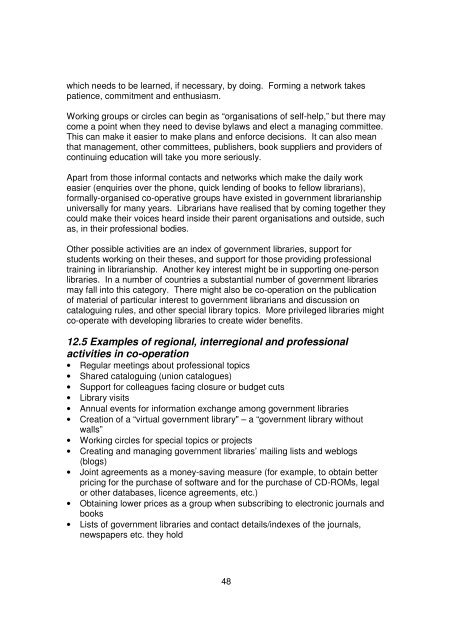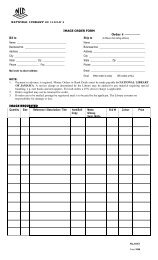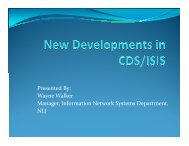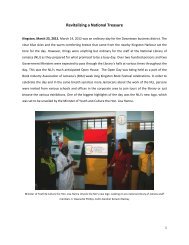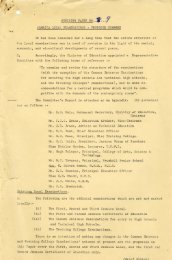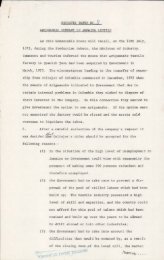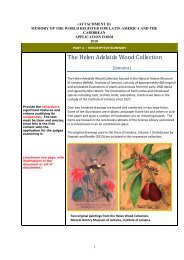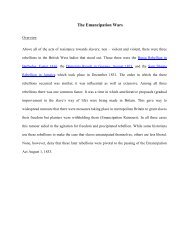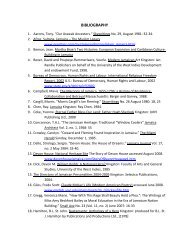Guidelines for Libraries of Government Departments - IFLA
Guidelines for Libraries of Government Departments - IFLA
Guidelines for Libraries of Government Departments - IFLA
You also want an ePaper? Increase the reach of your titles
YUMPU automatically turns print PDFs into web optimized ePapers that Google loves.
which needs to be learned, if necessary, by doing. Forming a network takes<br />
patience, commitment and enthusiasm.<br />
Working groups or circles can begin as “organisations <strong>of</strong> self-help,” but there may<br />
come a point when they need to devise bylaws and elect a managing committee.<br />
This can make it easier to make plans and en<strong>for</strong>ce decisions. It can also mean<br />
that management, other committees, publishers, book suppliers and providers <strong>of</strong><br />
continuing education will take you more seriously.<br />
Apart from those in<strong>for</strong>mal contacts and networks which make the daily work<br />
easier (enquiries over the phone, quick lending <strong>of</strong> books to fellow librarians),<br />
<strong>for</strong>mally-organised co-operative groups have existed in government librarianship<br />
universally <strong>for</strong> many years. Librarians have realised that by coming together they<br />
could make their voices heard inside their parent organisations and outside, such<br />
as, in their pr<strong>of</strong>essional bodies.<br />
Other possible activities are an index <strong>of</strong> government libraries, support <strong>for</strong><br />
students working on their theses, and support <strong>for</strong> those providing pr<strong>of</strong>essional<br />
training in librarianship. Another key interest might be in supporting one-person<br />
libraries. In a number <strong>of</strong> countries a substantial number <strong>of</strong> government libraries<br />
may fall into this category. There might also be co-operation on the publication<br />
<strong>of</strong> material <strong>of</strong> particular interest to government librarians and discussion on<br />
cataloguing rules, and other special library topics. More privileged libraries might<br />
co-operate with developing libraries to create wider benefits.<br />
12.5 Examples <strong>of</strong> regional, interregional and pr<strong>of</strong>essional<br />
activities in co-operation<br />
• Regular meetings about pr<strong>of</strong>essional topics<br />
• Shared cataloguing (union catalogues)<br />
• Support <strong>for</strong> colleagues facing closure or budget cuts<br />
• Library visits<br />
• Annual events <strong>for</strong> in<strong>for</strong>mation exchange among government libraries<br />
• Creation <strong>of</strong> a “virtual government library" – a “government library without<br />
walls”<br />
• Working circles <strong>for</strong> special topics or projects<br />
• Creating and managing government libraries’ mailing lists and weblogs<br />
(blogs)<br />
• Joint agreements as a money-saving measure (<strong>for</strong> example, to obtain better<br />
pricing <strong>for</strong> the purchase <strong>of</strong> s<strong>of</strong>tware and <strong>for</strong> the purchase <strong>of</strong> CD-ROMs, legal<br />
or other databases, licence agreements, etc.)<br />
• Obtaining lower prices as a group when subscribing to electronic journals and<br />
books<br />
• Lists <strong>of</strong> government libraries and contact details/indexes <strong>of</strong> the journals,<br />
newspapers etc. they hold<br />
48


